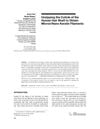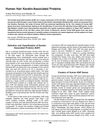Resistance of degraded hair shafts to contaminant DNA
April 2005
in “
Forensic Science International
”
TLDR Degraded hair shafts resist contamination and can be easily cleaned.
The study investigated the susceptibility of degraded human hair shafts to contamination by exogenous DNA sources such as blood, saliva, skin cells, and purified DNA. It was found that hair shafts are largely resistant to contamination or can be easily decontaminated, even when morphologically and biochemically degraded. This resistance is attributed to the hydrophobic and impermeable nature of keratin structures in hair. The study involved 10 hair samples from a single donor and demonstrated that endogenous mitochondrial DNA (mtDNA) could survive in degraded hair samples. Contaminant DNA from direct handling, blood, and saliva was generally removable, although severely degraded hairs exposed to fresh saliva posed some challenges. The findings highlighted the potential of hair as a reliable source of DNA for forensic and ancient DNA studies.

